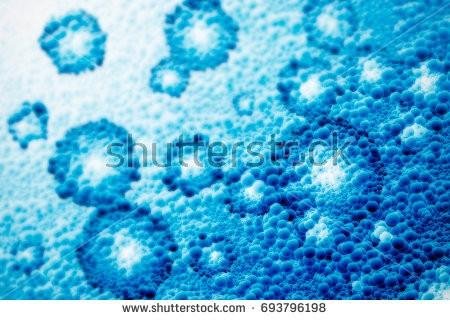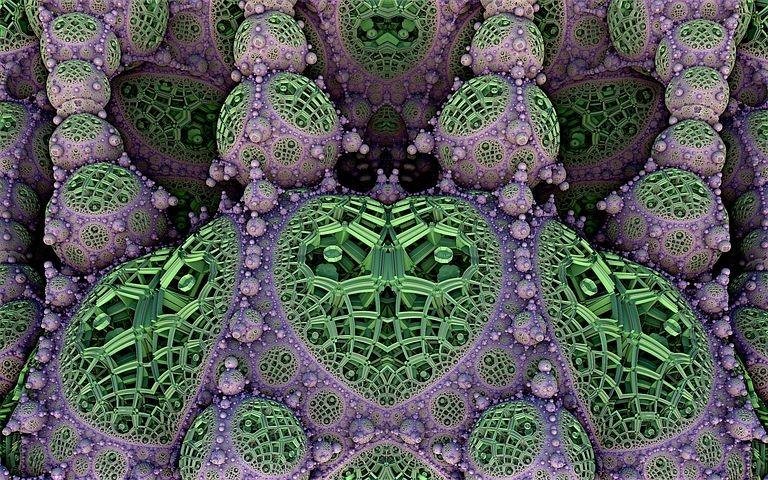Abiona K.I,Adedeji K. L.,Bolarinwa B.A.
Department of Biochemistry,
Faculty of Basic Medical Sciences,
Ladoke Akintola University Of Technology,
Ogbomosho,Oyo state Nigeria.
INTRODUCTION.
The contribution of nanotechnology and biotechnology in all spheres of life cannot be overemphasized.

The term ’’NANOTECHNOLOGY’’ was introduced by a professor at the Tokyo University of science named Professor Norio Taniguchi(Taniguchi 1974). Nano is a greek word which denotes small particles ranging from 1-100nm.

Nanoparticles can be synthesized biologically from microbes(such as bacteria,fungi,yeast,algae etc),plant products. and as well as from chemicals such as alcohol,sodium borohydride,sodium citrate etc.
Chemical synthesis of nanoparticles have been found to be mostly toxic,flammable,cannot be easily disposed off due to environmental issues and also show a low production rate(Mohanpuria et al,2008;Rai et al,2008;Sharma et al,2009;Bar et al,2009a,2009b.).this then makes researcher to prefer synthesizing nanoparticles biologically compare to synthesizing it chemically.
Nanoparticles has so many applications ranging from medical application,manufacturing of materials,electrical and electronics etc.


MEDICAL APPLICATION OF NANOPARTICLES.
ANTIMICROBIALS
The role of antimicrobial agents in protection cannot be overemphasized.Both gram positive and gram negative bacteria (microbes)are recognised and inhibited by these agents.
Determination of the effect of this agent is through the minimum inhibitory concentration( MIC).The best agents have good MIC against a wide range of bacteria including some of the most difficult to treat antibiotic resistant pathogen(Bahayaraj and Rajesh,2011)
In addition to the antimicrobial effect,some available biosynthetic nanoparticles have also been found to neutralise endotoxin and synergy with conventional andtibiotics especially aginst mutant resistant.as a result of this ability they have excellent potential in combating antibiotic resistant bacterial pathogens.
MECHANISM OF BACTERICIDAL EFFECT OF NANOPARTICLES
They are(biosytnthetic nanoparticles such as AgNPs,AuNPs)are found on the surface of the cell membrane where they are covalently bounded inhibiting the permeability as well as the respiratory function of the bacterial cell.
It has been reported that surface area of the nanoparticles is a factor to which extent their bactericidal activity is exerted. Smaller nanoparticles having large surface area available for interaction would give more bactericidal effect than larger particles having small surface area available for interactions. This mechanism inhibit the microbes and thus makes them unable to survive in that environment.
This mechanism is not only limited to interaction as a result attachment of nanoparticles to the cell membrane of the organism but may also be as a result of nanoparticles such as AgNPs penetrating the interior system of the bacteria.
ANTIOXIDANTS
Reactive Oxygen Species(ROS) are likely natural by products of the metabolism of respiring organisms such a prokaryotes and eukaryotes. Small level of ROS can be guarded by the antioxidant defences of the cells such as glutathione/glutathione disulfide (GSS/GSSH)ratio, oxidative stress occur when the ROS has overwhelm the antioxidant defences of the cell thus no(GSS/GSSH) to mopped up excess free radicals produced.
This additional generation of free radicals can assault cell membrane lipids and leads to a breakdown of membrane and mitochondrial function or cause DNA damage(Mendis et al,2005)
Free radicals like NO(nitric oxide),1,1-dphenyl-2-picrylhydroxyl(DPPH),H2O2(hydrgen peroxide) are scavenged by SNP's.

NITRIC OXIDE SCAVENGING ACTIVITY
Nitric oxide (NO) is an important bioregulaory molecule in the nervous,immune and cardiovascular systems(Rees et al.,1989).A scavenging activity was shown by bio synthesized AgNPs and the best activity 80.46%scavenging was observed at higher concentration of 10nanog/ml
The observed NO activity was lesser than that of the standard BHT(81.36%).interaction between AgNPs and nitric oxide under anhydrous,anaerobic conditions at room temperature and the NO radical which is very less stable with high electro negativity can easily accept electrons from soluble nanoparticles(Rodrigues et al.,2002.)
DRUG DELIVERY AND EFFICIENCY
Nanosized inorganic particles of either simple or complex nature,display unique physical and chemical properties and represent an increasingly important material in the development of novel nano devices which van be used in numerous physical,biological ,biomedical and pharmaceutical application(Loureiro et al,2011;Martins et al,2012;Nikalje,2015).
As a result of the unique activities of nanoparticles to cross the blood brain barrier (BBB),it helps in delivering drug as well as large molecules to the brain from an intravenous injection.For example,a known neurodegenerative diseases known as "Alzheimers disease"is a form of dementia with no cure and also associated with breakdown of blood brain barrier is experimented with a targeted nanoparticles which can helps in delivering amyloid to the brain.
This ability of nanoparticles to cross the blood brain barrier helps on delivering drug at a specific site and thus enhances its efficiency.
ANTICANCER
It is well known that silver ions and silver based components have strong biological activities (Furno et al,2004).
Macromolecules (containinng sulfur and phosphorous) such as proteins as well as DNA are impaired by silver nanoparticles as a result of their constituent elements. This identify the actions of silver nanoparticles to be as a consequence of adherence to the penetration inside the cell of the target cells.
The anti-proliferative effect of silver nanoparticles and silver was reported(Ahamed et al, 2008; Rahman et al,2009).
AgNP's have been found to penetrate tumor cells as a result of their enhanced cytotoxicity which may be probably due to their interference with efficient functioning and activities of cellular proteins and thus brings about changes in the cellular component.
Functional proteins of cells are hindered and tampered with as silvernanoparticles penetrate the cell.Based on the present study,the action model of AgNP's may be described as silver nanoparticles making a breakthrough in the permeability of outer membrane firstly,resulting in the leakage of cellular materials.
Secondly, silver nanoparticles enter the inner membrane and inactivate respiratory chain dehydrogenase ,thus inhibiting respiration and growth of cells (Alaa et al,2013).
Silver nanoparticles(AgNP's) with good anticancer activities can be synthesized from readily available, relatively cheap and none toxic materials using C. colocynthis aqeous extract.
REFERENCES
-Sharma B, Purkayastha DD, Hazra S, Thajamanbi M, Bhattacharjee CR, Ghosh NN, Rout J (2014) Biosynthesis of fluorescent gold nanoparticles using an edible freshwater red alga, Lemaneauviatilis (L.) C. Ag. and antioxidant activity of biomatrix loaded nanoparticles. Bioprocess Biosyst Eng 37(12):2559–2565
-Bar, H., Bhui, D.K., Sahoo, G.P., Sarkar, P., De, S.P. and Misra, A. 2009a. Green synthesis of silver nanoparticles using latex of Jatropha curcas. Colloids Surf A: Physicochem Eng Asp, 339: 134–139.
-Bar, H., Bhui, D.K., Sahoo, G.P., Sarkar, P., Pyne, S. and Misra, A. 2009b. Green synthesis of silver nanoparticles using seed extract of Jatropha curcas. Colloids Surf A: Physicochem Eng Asp, 348: 212–216.
-Furno, F., Morley, K.S., Wong, B., Sharp, B.L. and Howdle, S.M. 2004. Silver nanoparticles and polymeric medical devices: a new approach to prevention of infection. J. Antimicrob. Chemother., 54: 1019-1024. [
-Taniguchi, N. 1974. On the basic concept of nano-technology Proceedings of the International Conference on Production Engineering Tokyo Part II Japan Society of Precision Engineering.
-Rees DD, Palmer RM, Moncada S (1989) Role of endotheliumderived nitric oxide in the regulation of blood pressure. Proc Natl Acad Sci USA 86:3375–3378.
-Rodriguez-Gattorno G, Diaz D, Rendon L, Hernandez-Segura GO (2002) Metallic nanoparticles from spontaneous reduction of silver (I) in DMSO. Interaction between nitric oxide.
Good stuff Kenny! :) It's interesting info.. I feel like i'm back in school too.. :P
Smiles, school is too stressful. I feel like been a graduate already. Thanks boss for your contribution.
Nanoparticles are going to have a major impact on health sector, or already having it. Which were impossible to think a few years earlier are going to be happening in near future with the help of such technology.
Thanks for such wonderful post :) Really informative.

Thanks so much doc, do you know nanoparticles can also be employed in sterilizing surgical equipment?. That is one out of the great advantages of this small particles. Thanks for your contributions.
Great post on a fascinating topic @donkenney@1992! (Note: might want to reconsider using Shutterstock images).
Thanks so much dear, I really appreciate your contribution. Shutterstock images? Kindly expatiate please dear...
Yes, the image you have with a "Shutterstock" watermark and not for use unless you pay for them. This is why they have a watermark. Just because you give the source attribution does not also mean that they can be used here on Steemit without a paid license.
Wow. So lovely. Hope to read and learn more from you.
Regards.A very interesting topic, friend @donkenny1992.